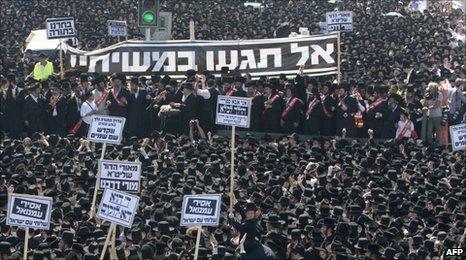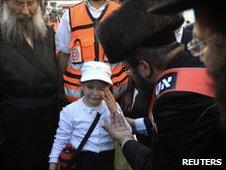Israel jails ultra-orthodox fathers over school dispute
- Published

The fathers surrendered wearing sashes that read: "Prisoners of God"
Dozens of ultra-orthodox Jewish men have been jailed for defying a school integration ruling in Israel, but 22 mothers have been given a reprieve.
The Ashkenazi parents were given two weeks' jail time for refusing to send their children to school with Jewish Sephardi girls, on religious grounds.
Masses of ultra-orthodox Jews staged one of the biggest protests against the state of Israel on Thursday.
They oppose a Supreme Court ruling that forbids the separation of students.
The Ashkenazi parents, who are of European descent, want segregated classrooms because they say the Sephardi families are not religious enough.
Sephardi families are of Middle Eastern or North African origin, with ancestors originating from the Iberian peninsula.
Mass demonstration

A father comforts his daughter before he enters prison
As tens of thousands of ultra-orthodox protesters packed into the centre of Jerusalem on Thursday, 35 fathers handed themselves in to the police to begin their two week jail terms.
But the mothers were given a stay of arrest while an Israeli court considered a plea to let them stay at home to care for their children.
"We shall wait for the court's decision before taking any action," police spokesman Micky Rosenfeld told the AFP news agency.
The ruling is expected on Sunday, local media report.
On Thursday, some 120,000 Ashkenazi Jews rallied in Jerusalem and Bnei Brak, near Tel Aviv, in the biggest demonstration by the ultra-orthodox community in over two decades.
The families at the centre of the legal battle come from a strictly observant sect of Hasidic Jews called Slonim, who have Ashkenazi lineage.
They have pulled their children out of Beit Yaakov girls' school in the West Bank settlement of Immanuel, saying the less observant students would be a bad influence on their children.
The parents follow strict religious codes and do not allow influences such as televisions and the internet in their homes.
- Published17 June 2010